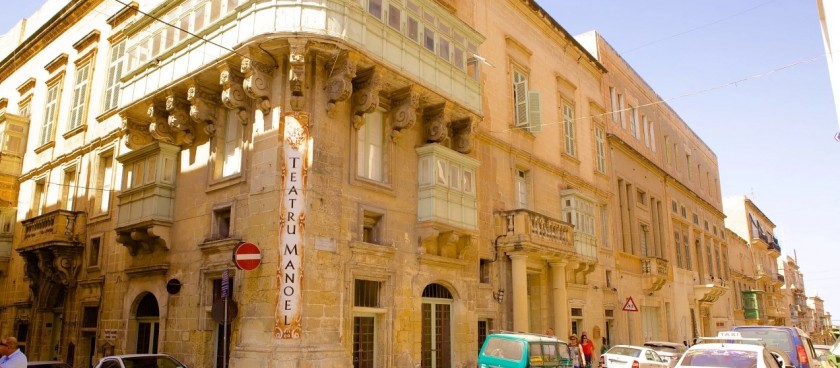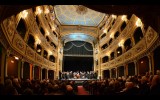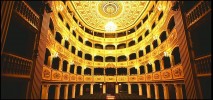- #MT43
- Old Theatre Street, Il-Belt Valletta, Malta
- +35621246389
- bookings.mt@teatrumanoel.mt
- http://www.teatrumanoel.com.mt
- Working hours*:
Mon - Fri 10.00 - 19.00
Sat 10.00 - 13.00 - Prices*:
Discounted seats are available for most perofrmances on a first-come first-served basis for
Karta Anzjan holders
Students
Senior citizens and student card holders need to show relevant identification at the Booking Office in person. - * - opening and closing times as well as entrance prices, are subject to alterations without notice. Visitors are advised to check before visiting.
- If you use a wheelchair, please bring this to our attention at the time of booking.
- 35.8997590, 14.5123803 Copy to clipboard Copy
-
#Theatres
THE BEGINNING
Following centuries of unrest and a myriad of conquerors, the rule of the Military Order of St. John brought about a period of unprecedented stability and development to the Maltese Islands. The newly constructed fortified capital, Valletta, administrative centre and home to the variety of nationalities forming the Order, witnessed a further development as the islands’ cultural and entertainment hub.
Throughout the 17th and early 18th centuries, the demand for operas, pageants, theatrical and dramatic productions boomed as the Maltese embraced what had previously been entertainment reserved solely for the Nobility. Shows put on by amateurs and theatre professionals were then housed at the Knight’s Auberges around the city or in the open.
In 1731, António Manoel de Vilhena, Grand Master of the Knights of Malta, commissioned and personally funded the construction of this central building to serve as a Public Theatre.It was constructed in just ten months and cost 2,184 scudi. The Portuguese Grand Master built the theatre to keep the young knights of the Order of St. John out of mischief but also to provide the general public with "honest entertainment." This motto was inscribed above the main entrance to the theatre, which still reads today: "ad honestam populi oblectationem". The first performance on the 19th January 1732 , was a classic Italian tragedy, Scipione Maffei’s Merope. The players in that production were the Knights themselves, and the set was designed by the Knights` chief architect, Francois Mondion.
The management of the theatre and the censorship of the performances was in the hands of a knight who was called “Il Protettore”.
In those days, opera performed by professionals was performed at least as often as drama. Works by the great master of "opera seria" Johann Adolf Hasse were often performed during the theatre’s early decades, but just as popular throughout the century was the rival "opera buffa" by leading composers like Nicolo` Piccinni, Baldassare Galuppi and Domenico Cimarosa.
The continuous theatrical exchange between Naples, Palermo and Valletta made Teatru Manoel a natural stepping stone for aspiring artists `to step up the ladder leading to La Scala or Covent Garden`.
The first impresario of whom we have record was Melchiorre Prevvost Lanarelli in 1736, and the last Giovanni Le Brun in 1866. From 1768 to 1770 the impresario was a woman, a certain Natala Farrugia. Grand Master de Vilhena fixed the rent to be paid by the Impresario at 320 scudi per annum, of which 80 scudi were paid for rent from Easter to August, 120 scudi for Autumn, and 120 scudi from Christmas to Carnival. From the records we learn that when dances or veglioni (masked balls) were held in the theatre, the pit was raised by scaffolding to the level of the stage, and we find that on August 22, 1778, regulations were passed for the lighting of the theatre and corridors. On these occasions the shading of lights, in any manner, was prohibited, so as to keep the entertainment in the theatre, as honest as possible !
RESTORATION
In the year 2004, the team of Sante Guido Restauro e Conservazione di Opere d Arte, unearthed paintings that, could serve to increase the knowledge and the understanding as to how the theatre developed over the centuries. The findings have emerged from beneath the flaking green paint on the top tier. Although the gallery was added in 1811, the restorers did not rule out that the paintings in its balconies could match the lower levels and could, therefore be the original designs dating back to the year 1731, the year this magnificent theatre was inaugurated. Since the inauguration of the theatre, the balconies would appear to have undergone four interventions: the discovered paintings on the canvas layer, the green paint over them, the paneling and the gilding. After the first phase of the restoration of the paneling, the second phase followed with proper cleaning, removal of layers of dust and grime and the repair of breakages in the wooden, gilded decorations which were split in many areas. The question remains: why were the original paintings covered, and what changes in culture brought this about ? The answer could simply lie in the different cultural tastes of time, or could be something more fascinating
HOUSE RULES
Members of the public are asked to respect the following house rules:
- Audience members must be in possession of a valid ticket at all times. These must be handed over for inspection by Teatru Manoel staff when requested. Ticketholders must sit in the seats allocated to them.
- Latecomers will not be admitted once the performance has started and will be asked to wait in the foyers until the first interval, when they may take their seats.
- Children under 6 years of age will not be admitted to the theatre.
- In general, we ask that you wear clothing that is in keeping with the decorum of the theatre.
- Patrons should exercise appropriate behaviour at all times and remain silent in the theatre during performances.
- The use of mobile phones is strictly prohibited in the theatre. Patrons are requested to switch off their mobile phones and refrain from referring to them during the performance.
- The use of photographic equipment and audio/video recording devices of any kind is not permitted in the theatre.
- Smoking is not permitted on Teatru Manoel premises.
- Food and drink must not be consumed outside bar areas. Food and drink is not permitted in the theatre or boxes.
- Should you have any problems or specific requirements, our section supervisors and head usher are on hand to assist.


